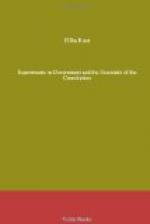The expedient of representation first found its beginning in the Saxon witenagemot. It was lost in the Norman conquest. It was restored step by step, through the centuries in which parliament established its power as an institution through the granting or withholding of aids and taxes for the king’s use. It was brought to America by the English colonists. It was the practice of the colonies which formed the Federal Union. It entered into the constitution as a matter of course, because it was the method by which modern liberty had been steadily growing stronger and broader for six centuries as opposed to the direct, unrepresentative method of government in which the Greek and Roman and Italian republics had failed. This representative system has in its turn impressed itself upon the nations which derived their political ideas from Rome and has afforded the method through which popular liberty has been winning forward in its struggle against royal and aristocratic power and privilege the world over. Bluntschli, the great Heidelberg publicist of the last century, says:
“Representative government and self-government are the great works of the English and American peoples. The English have produced representative monarchy with parliamentary legislation and parliamentary government. The Americans have produced the representative republic. We Europeans upon the Continent recognize in our turn that in representative government alone lies the hoped-for union between civil order and popular liberty.”
The Initiative and Compulsory Referendum are attempts to cure the evils which have developed in our practice of representative government by means of a return to the old, unsuccessful, and discarded method of direct legislation and by rehabilitating one of the most impracticable of Rousseau’s theories. Every candid student of our governmental affairs must agree that the evils to be cured have been real and that the motive which has prompted the proposal of the Initiative and Referendum is commendable. I do not think that these expedients will prove wise or successful ways of curing these evils for reasons which I will presently indicate; but it is not necessary to assume that their trial will be destructive of our system of government. They do not aim to destroy representative government, but to modify and control it, and were it not that the effect of these particular methods is likely to go beyond the intention of their advocates they would not interfere seriously with representative government except in so far as they might ultimately prove to be successful expedients. If they did not work satisfactorily they would be abandoned, leaving representative government still in full force and effectiveness.




